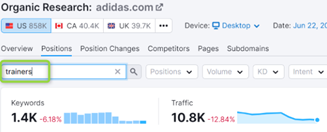The Importance of English Variants in Marketing & Advertising
We think of English as this one massive language reaching across many countries around the globe and understood by billions as a first language and, if not native, then at least as a secondary language. Of course we all know there is slang and special local terminology for each market where English is an official language. However, the common belief is that variations do not differ that greatly to lead to mutual unintelligibility between English-speaking countries.
Because of this perception it is absolutely key to remember that targeting local variants of English is crucial for success in advertising and marketing.
Unfortunately, budgeting considerations often get in the way when target market decisions are made, especially across markets where presumably the exact same official languages are used. Why should you consider targeting local English variants? Surely most people will understand what your content means? This article will discuss why a local approach is the best option.
English is spoken all over the world. Aside from the well-known native English-speaking countries such as the UK, Australia, the US and Canada, it is spoken in the Caribbean, for example, in the Bahamas and Barbados, as well as being commonly used in many other countries around the world like India, South Africa, Singapore and Malaysia.
English is a large and rich language. The Oxford English Dictionary contains 600,000 words, past and present, from across the English-speaking world 1 while there are 135,000 entries in the French dictionary, Larousse 2. Of course, other languages such as German, Turkish and Chinese have equally large vocabularies for different reasons, such as compound words 3, but the range and scope of English should be taken into account when creating local content.
Local Search Demand
Why then is it so important to target the correct English variant? In SEO, there are several reasons to consider. One of the most important is the variations in search demand for certain local terms. An obvious example is of course the word pants versus trousers. Aside from the difference in meaning in different English-speaking countries, search volumes differ significantly among markets and forgetting to target local variations means missing out on highly relevant traffic in the local market.
A less obvious example in the Irish market is the word runners instead of trainers. When looking at one of our major client’s performance in this market, the potential is undeniable. The aggregated search volume for adidas runners related keywords is 52,620 versus 71,780 for adidas trainers. Including the term runners in Irish English content will increase the number of keywords the site would rank for and with it the number of impressions, clicks and subsequent traffic to the site.
The important thing to remember is that the issue is not that your English-speaking customers will not understand your content but that by not targeting the keyword runners, you are missing out on highly relevant, local traffic. At the same time, targeting relevant local terms like this will give you an edge on competitors who are not – quick wins all round.

Semrush adidas.co.uk organic traffic for keywords containing ‘trainers’ versus ‘sneakers


Semrush adidas.com organic traffic for keywords containing ‘trainers’ versus ‘sneakers

Understanding local search demand can be a factor in determining your international expansion strategy. An example is the below search demand for ‘vegan chocolate’:
|
Average Monthly search volume |
Estimated population in millions |
|
|
United States |
22,200 |
329.5 |
|
United Kingdom |
22,200 |
67.22 |
|
Australia |
5,400 |
25.69 |
|
Canada |
2,900 |
38.01 |
Popularity for the vegan diet has skyrocketed in recent years, but it is more popular in some countries than in others. Search volumes for vegan chocolate are the same in the UK and the US. However, with the US population being almost five times larger, it is clear that vegan chocolate is more popular in the UK, which could be a deciding factor in expanding to this market.
Understanding and leveraging available data on consumer behaviour, in addition to adopting a hyper-localised approach with relevant linguistic requirements, intrinsically helps businesses to successfully implement and navigate cross-cultural marketing campaigns worldwide, and celebrating language with data is one of the core Locarian values.
Strategic SEO content
Aside from linguistics, cultural differences among English-speaking countries should play a defining role in determining your English-language SEO content strategy. Different markets will require different strategies so simply publishing the same content across multiple markets will not always be enough to drive traffic.
One example of this is sports-related content. Each market has its own popular sports and creating content tailored to specific markets can drive relevant, local traffic, whereas simply duplicating content across multiple markets can create the opposite effect. In the US, content related to American Football (Football SV 1,220,000) will be of interest to many, while in the UK (American Football SV 27,100) interest is minimal. Similarly content related to rugby (US SV 110,000) will generate much more interest in the UK (UK SV 201,000).
Competitor content is often used to identify new content opportunities. This is another great opportunity to tailor your strategy to the individual market, instead of by language, because the competition in each market will be vastly different. Checking out local competitors will reveal successful in-market content and help you identify opportunities for your own strategy.
Summary
To create successful content, solid background, competitor and keyword research is essential to understand local search demand, to determine cultural interests and to build a targeted SEO strategy.
Finally, in addition to tailoring your content to local preferences, it is essential to ensure your international website is in order from a technical perspective. Implementing hreflang tags (tags that allow Google to direct users speaking a different language to the appropriate content) and choosing the right domain setup are crucial in getting your international strategy right. Again, quick wins – all round.
Article by Lorraine van den Biggelaar, International SEO Manager
Co-authored by Rachael Bradley, Multilingual Paid Media Channel Manager




